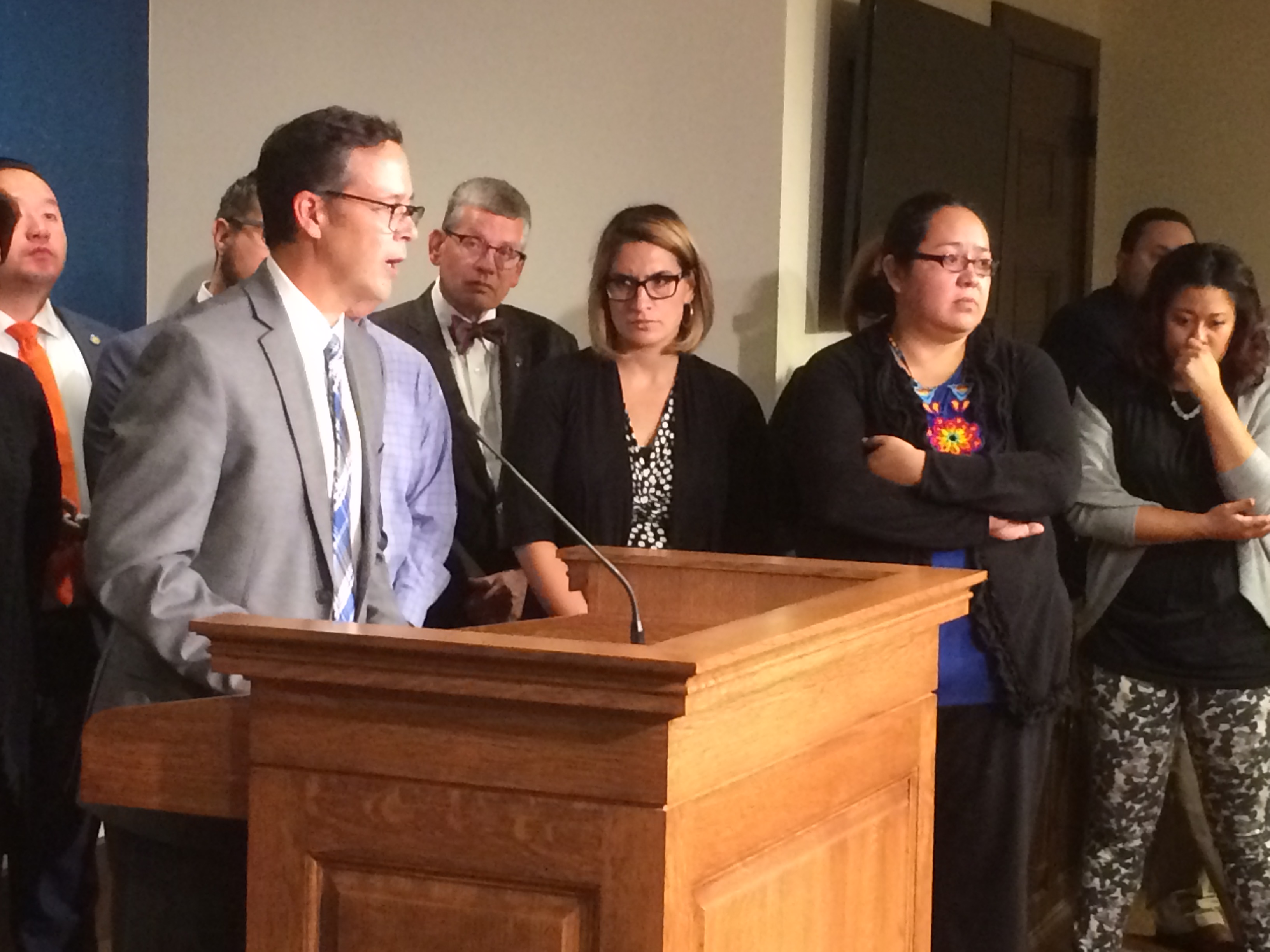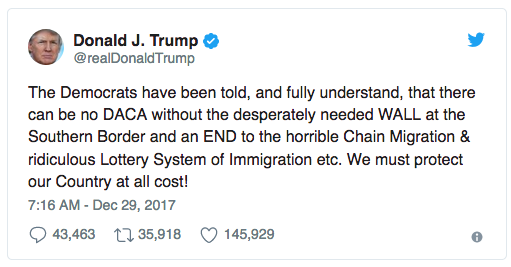News > Immigration In The United States
DACA and Dreamers: Down to Decision Time
Posted on Jan 04 2018

January 19 is the next crucial decision date for DACA and Dreamers. That’s when funding for running the government runs out, unless Congress passes an extension. To pass an extension, Republicans need some Democratic votes in the Senate. That gives Democrats leverage to demand a clean Dream Act in exchange for their votes to keep the government open.
Time is running out for DACA recipients – 122 per day, about 14,000 since September 5 are losing DACA protection. After March 5, the number losing DACA protection—and subject to immediate deportation—jumps to about 1,000 per day. Even if Congress passed a Dream Act today, full implementation would take an estimated seven months. In the meantime, no one trusts the Trump administration to hold off on deporting Dreamers, no matter what the law says.
Here’s a status update on the political players and their positions, brief descriptions of competing “clean” and “dirty” Dream Acts, a timeline, and a list of actions you can take.
Politicians and positions
Trump
On September 7, Trump said DACA recipients “had nothing to worry about,” that Congress would pass a fix and he would sign it. Later in the month, he backed off and said he had made no deal with Democrats to sign a Dream Act. Now he says DACA extension or a Dream Act is conditioned on agreement on a border wall, an end to family visas (“chain migration”), and end to the diversity visa lottery. And maybe also E-Verify. And, and, and—no one knows what he really wants, probably including Trump himself.
One example: Does “the wall” mean repairing the walls already on the border? Does it mean “wall components” (Republican Senator Lindsey Graham’s guess)? Or does it mean Trump’s original demand, a 30-foot-tall, 2,200-mile-long, ocean-to-ocean wall?

Democrats
Many Democrats in the House gave in and voted for the keep-the-lights-on budget bill in December. Most Democrats in the Senate refused, with 17 notable exceptions.
The real question for Democrats in January: How strong will they stand? Will they refuse to vote for another keep-the-lights-on bill unless there is a Dream Act attached? Are they willing to shut down the government to get a Dream Act?
Republicans
Many Republicans have promised to support Dreamers. Some might actually do it. They can read the writing on the wall: an overwhelming majority of Americans in both parties support the Dream Act.
On the other hand, with “friends” like Senator Mitch McConnell, who needs enemies? McConnell said, “There’s no emergency” about passing a Dream Act – as far as he’s concerned, March is early enough. Other Republicans propose an extension of DACA that would create a permanent second-class status for Dreamers: no permanent residence and no path to citizenship.
Dream Act: Clean or dirty
At some point, the question will become not only when but which Dream Act will pass. A “clean” Dream Act means legislation that does not include penalties for parents of Dreamers, or other restrictions on immigration. Here are five contending bills, as summarized by the Los Angeles Times:
- Development, Relief and Education for Alien Minors Act (Dream Act): bi-partisan sponsorship, conditional permanent resident status, with possibility of legal permanent resident status and road to citizenship.
- The Recognizing America’s Children (RAC) Act: Republican sponsorship, more limitations on much longer path to permanent residence and citizenship.
- Solution for Undocumented Children through Careers Employment Education and Defending our Nation Act (SUCCEED): Republican sponsorship, 15-year path to legal residence and citizenship; requires signed waiver of some rights; says no Dreamer can sponsor a parent for immigration.
- Bar Removal of Individuals Who Dream and Grow our Economy Act (BRIDGE): bi-partisan sponsorship, offers conditional three-year extension of DACA with no path to legal residence or citizenship.
Besides these bills, all focused primarily on Dreamers, the Reforming American Immigration for Strong Employment Act (RAISE Act) is the administration’s anti-immigrant bill, proposing to implement “merit-based” visas and abolish most family-based immigration.
Timeline
2001: First Dream Act introduced in Congress.
December 2010: Dream Act passes the House, but fails to get the 60 votes needed to overcome a Republican filibuster in the Senate.
June 15, 2012: The Obama administration issues a memorandum establishing Deferred Action for Childhood Arrivals. DACA begins.
2015: Obama tries to expand DACA (DACA+) and to begin Deferred Action for Parents of American Citizens and Legal Residents (DAPA). Texas and 25 other states sue, and succeed in getting a temporary order stopping implementation of DACA+ and DAPA.
June 15, 2017: The Trump administration rescinds DAPA and DACA+.
September 5, 2017: On orders from Trump, Attorney General Jeff Sessions announces the end of DACA, effective March 5. He says that anyone whose DACA status expires between September 5 and March 5 must apply for renewal before October 5, 2017. Anyone whose DACA status expires after March 5 will be allowed to stay in the United States and work until the expiration date—then they have to leave.
October 5, 2017: End date for renewals – quickly eclipsed by news that renewals that were filed on time were denied as untimely. After initially denying its mistakes, the administration agreed to send letters to people who were unjustly denied, giving them directions on how to resubmit applications, but those letters have been slow in arriving. Meanwhile, anyone whose application was denied is at risk of deportation.
December 7 and 21, 2017: Congress twice passed stop-gap funding bills, each delaying a government shutdown and kicking the can down the road to a future date.
January 19, 2018: The next time the government runs out of money and shuts down—or not. The budget vote is the opportunity for Democrats to force a vote on the Dream Act.
What you can do
- Call and keep calling Congress. This link will help you call your own Congressmembers.
- Go one step further and call and email the three Minnesota Republican representatives. Representatives Paulsen and Emmer have said they support Dreamers, but they need to do more than that – they need to lead on this issue. They need to know that supporting Dreamers means passing a clean Dream Act NOW. Call:
• Representative Jason Lewis (Phone 202-225-2271 in DC office, 651-846-2120 in Burnsville office),
• Representative Tom Emmer (Phone 202- 225-2331 in DC office, 763-241-6848 in Otsego office), and
• Representative Erik Paulsen (Phone 202- 225-2871 in DC office and 952-405-8510 in Eden Prairie.) - Spread the word. Share this article and others on your Facebook page. Talk to family and friends. Enlist their help in calling Congress.
- Follow us on Facebook for the latest news.
- Never give up.
x x x
On January 3, three former DHS secretaries warned that the window for protecting DACA recipients is closing fast. The three are Janet Napolitano and Jeh Johnson, who served under President Barack Obama, and Michael Chertoff, who served under President George W. Bush. From their letter to the New York Times:
“We write not only in strong support of this legislation, but to stress that it should be enacted speedily, in order to meet the significant administrative requirements of implementation, as well as the need to provide certainty for employers and these young people,” the letter said. “For these reasons, the realistic deadline for successfully establishing a Dreamers program in time to prevent large-scale loss of work authorization and deportation protection is only weeks away, in the middle of January.”




